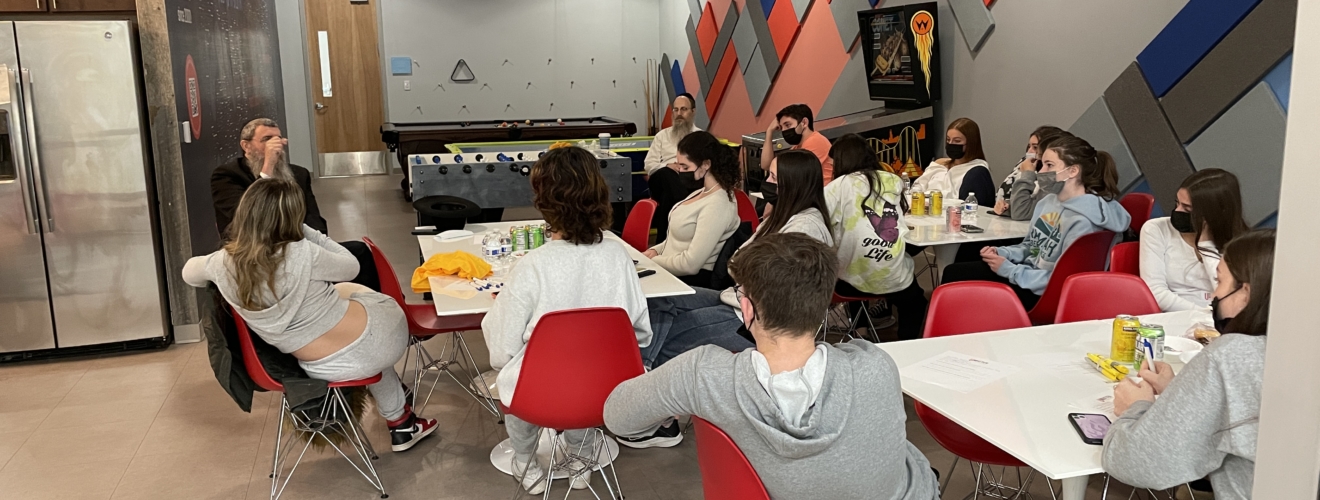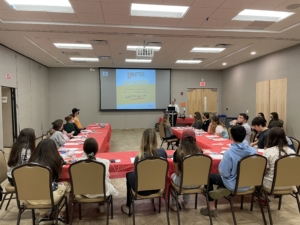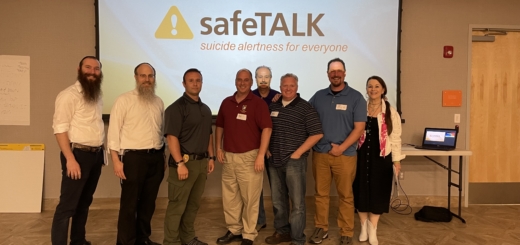UMatter, Healthcare Foundation Tackle Mental Health Crisis

If someone you knew was dealing with anxiety, would you know how to help them? Could you help a friend navigate social challenges? Would you know what to do if a friend is feeling depressed? Answering those questions is at the heart of UMatter, a new program from Friendship Circle aimed at combatting the mental-health crisis facing young people today.
“We know that many teens and young adults were already facing significant mental-health challenges before the pandemic, and studies have shown that the crisis has only grown, especially among those 12-25. This is why we felt it was imperative to change the conversation and break down barriers to discussions about these issues,” said Friendship Circle CEO Rabbi Zalman Grossbaum.
UMatter began as a pilot program last summer and is poised to roll out a full offering from Friendship Circle in partnership with the Mental Health Association of Essex and Morris, thanks in large part to a challenge grant of $50,000 from the Healthcare Foundation of New Jersey.
Michael Schmidt, executive director and CEO of the Healthcare Foundation, said the organization is “concerned with the dramatic rise of mental health concerns in youth today,” and “is pleased to support LifeTown in its efforts to bring the nationally recognized curriculum of UMatter to Essex County, N.J. UMatter will empower teens to address stigmas surrounding mental health challenges and, in particular, suicide, which has been sadly rising at an alarming rate.”
Like Friendship Circle itself, UMatter is guided by the teachings of the Lubavitcher Rebbe, Rabbi Menachem M. Schneerson, of blessed memory. In various writings, he sought to provide solace to those facing mental-health challenges. He encouraged people to seek medical help when needed and help others as a way to change how they see themselves.

The Rebbe also spoke directly about teens saying the move from child to adult is a time that “entails considerable strains. … it is obviously the sacred duty of every near and dear one, and especially parents, to do all things possible to promote the teenager’s peace of mind and thereby make their struggles easier… .”
That is at the heart of UMatter.
According to a June report from the Centers for Disease Control and Prevention, suicide attempts among girls ages 12-17 were more than 50 percent higher in early 2021 than in the same period of 2019. One of the myriad reasons young people are more at risk for mental-health challenges, particularly attempted suicide, is due to “barriers to mental health treatment; increases in substance abuse; and anxiety about family and economic problems.”
To help raise awareness of suicide, UMatter offers safeTALK, a nationally recognized suicide-prevention program. Seventy-five people have already participated in the training since UMatter’s soft launch this summer.
However, UMatter director Rabbi Yisroel Rosenblum is quick to point out that the program isn’t just about suicide prevention. UMatter it is multifaceted and nuanced to address numerous mental-health issues facing teens, including anxiety, depression, self-image and stress.
“Our teens are facing challenges and pressures previous generations never experienced. Yet, they may not know how to get help or express the level of stress, hurt or other emotion they are feeling, that’s where UMatter comes in,” he said. “Teens who participate in our programs not only come away with a better sense of self, they emerge with the tools to help recognize when their friends may be suffering.
“By giving them these tools,” Rabbi Rosenblum continued, “we are encouraging to break down the barriers to discussions on mental health.”
Robert Davison, CEO of Mental Health Association, FC’s partner in UMatter, said the program is an “innovative and timely response to teen mental health and suicide prevention. UMatter is a program whose time has come. We need to be there for, and with the young people in our community. UMatter stands with our youth and empowers them to make a difference in their own mental health and in the mental health of their peers.”
Even the name itself can have a positive effect. As Marcy Felsenfeld, senior program officer of the Healthcare Foundation, said, “Every teen needs to hear UMatter—you matter—on a daily basis.”
According to Nancy Friedman, a psychologist with Montclair State University’s Counseling and Psychological Services, the UMatter premise of teens helping teens “is wonderful, because teens don’t necessarily want to reach out to adults.”

She went on to say that training teens to recognize the signs of mental health issues and how to direct a friend in crisis to the appropriate help can only benefit young people, But, she adds, “It’s important to find a balance to support and recognize the signs, but also not feel overwhelmed by the responsibility.”
That’s why all UMatter training encourages teens to reach out to adults with experience and that vetted organizations that can provide assistance are listed on the UMatter website and in programming materials.
In addition to providing workshops for teens, UMatter also offers programming for adults as well. It has already offered SafeTALK training to members of local law enforcement and educators, and run a multi-part parenting workshop.
Said Rabbi Rosenblum, “It is important to keep the lines of communication open and encourage children and teens to talk about their struggles and remind them that they are not alone and help is available.”

